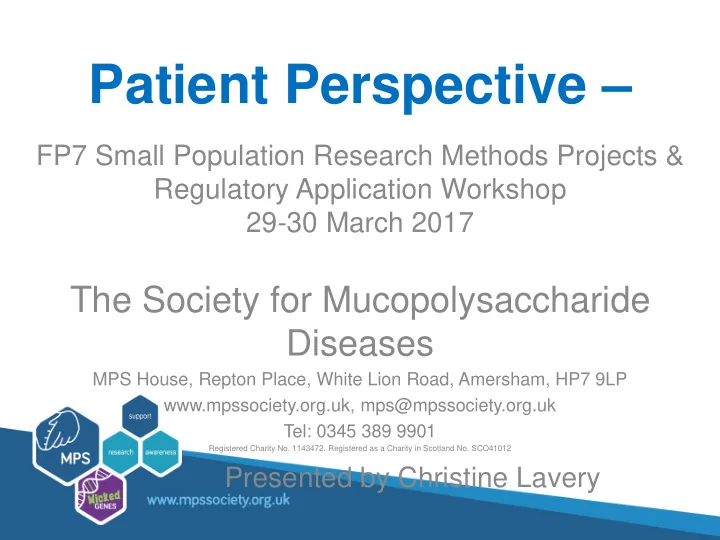

Patient Perspective – FP7 Small Population Research Methods Projects & Regulatory Application Workshop 29-30 March 2017 The Society for Mucopolysaccharide Diseases MPS House, Repton Place, White Lion Road, Amersham, HP7 9LP www.mpssociety.org.uk, mps@mpssociety.org.uk Tel: 0345 389 9901 Registered Charity No. 1143472. Registered as a Charity in Scotland No. SCO41012 Presented by Christine Lavery
Clinical Trials for Ultra Orphan Diseases What are the challenges • Small Numbers of Patients • Disease Heterogeneity • Inconsistent Clinical Expertise • Choice of Study Design • Need for Multi Clinical Study Sites • Quality of Life Data
How Has The MPS Society Addressed These Challenges? Clinically • 35 years of demographic data held on the MPS Society’s registry • Understanding the disease population • European collaboration • Nurturing world leaders in the clinical management of MPS
How Has The MPS Society Addressed These Challenges? Working with the Pharmaceutical Industry • Become knowledgeable of pre clinical work • Develop a professional relationship with the pharma company • Identify areas of mutual benefit in clinical trial design
MPSIV Disease Heterogeneity
Clinical Trial Design for MPSIVA • Known MPSIVA population in England of 88 • Knowledgeable group of patients and Parents • Company’s Disease Understanding Different to the Patient experience • Focus Groups convened that demonstrated a need to address pain and fatigue which was then taken into consideration for the pivotal clinical trial design
Inconsistent Clinical Expertise Due to small populations in ultra orphan diseases phase III / IV (pivotal clinical trials) trial sites are often spread across the globe where clinical expertise varies considerably and brings inconsistency into the clinical trial particularly where there are only one or two patients per study centre.
Study Design The MPS Society is familiar with double blinded placebo controlled clinical trials. In MPS VII phase I/II clinical trial with three patients the Intervention Model with a Single Group Assignment was used. Moving forward adaptive clinical trial studies may offer ultra orphan disease patients a more objective option
Translating Marketing Approval to Individual Country Regulatory Approval • Disconnect between evidence required for post marketing approval and evidence being sought by individual country regulatory bodies for reimbursement • Regulatory approval is increasingly about budgets even when evidence of efficacy is strong
Conclusion • There is a need for clinical trials to be designed at the initial stages to accommodate not just the EMA marketing approval process but for the data to meet the needs of individual reimbursement regulators • The ABPI and EFPIA codes of practice need to recognise that patient organisations play an important role in relating the patient experience to the pharmaceutical industry in clinical trial design and this can only be a fruitful engagement if there is a two way dialogue
Recommend
More recommend